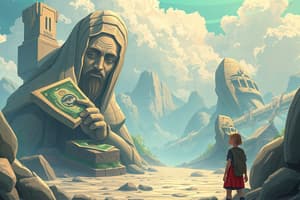Podcast
Questions and Answers
The act of exchanging goods for goods is called...
The act of exchanging goods for goods is called...
barter
Provision for making payments in future is known as...
Provision for making payments in future is known as...
deferred payments
The primary function of money is as a medium of...
The primary function of money is as a medium of...
exchange
In the context of ______, the standard of deferred payments refers to...
In the context of ______, the standard of deferred payments refers to...
What are the difficulties faced in the barter system?
What are the difficulties faced in the barter system?
Name the definitions of money according to Prof Crowther?
Name the definitions of money according to Prof Crowther?
Which types of money came into existence due to the evolution of money?
Which types of money came into existence due to the evolution of money?
Paper money is a substitute for metallic money.
Paper money is a substitute for metallic money.
What is electronic money?
What is electronic money?
What defines legal tender money?
What defines legal tender money?
What are the qualities of money?
What are the qualities of money?
What is black money?
What is black money?
The most liquid asset is...
The most liquid asset is...
Match the following types of money with their descriptions:
Match the following types of money with their descriptions:
Identify the types of money used in the information.
Identify the types of money used in the information.
Explain any two of the types of money.
Explain any two of the types of money.
Flashcards are hidden until you start studying
Study Notes
Introduction to Money
- Barter system involves exchanging goods directly, but led to fundamental economic difficulties.
- The invention of money transformed economic activities by facilitating trade and satisfying human wants.
Difficulties in Barter System
- Double Coincidence of Wants: Essential for exchange; both parties need to want what the other offers.
- Lack of Common Measure of Value: No standardized units to compare commodities, complicating transactions (e.g., comparing milk to rice).
- Storage Issues: Perishable goods like milk and vegetables were hard to store.
- Indivisibility of Goods: Some commodities, such as animals or houses, cannot be divided for trade, complicating exchanges.
- Deferred Payments: Difficulty in future payments using perishable goods made loan repayments challenging.
Definitions of Money
- Prof Crowther: Describes money as generally acceptable for exchange and a means to measure and store value.
- Prof Walker: Defines money by its functions and capabilities.
Evolution of Money
- Money developed through various phases, each linked to societal needs.
- Types of Money include:
- Animal Money: Early barter involving live animals.
- Commodity Money: Natural commodities used for trade influenced by cultural and climatic factors.
- Metallic Money: Utilized durable metals but faced issues with scarcity.
- Metallic Coins: Standardized pieces with governmental seals emerged for uniformity and legal recognition.
- Paper Money: Substituted for metal coins, issued solely by government and central banks.
- Bank Money/Credit Money: Bank deposits facilitating transactions via cheques and drafts.
- Plastic Money: Debit and credit cards improving the ease of transactions.
- Electronic Money: Digital funds stored and transferred online through devices.
Qualities of Money
- General Acceptability: Widely recognized and used for trades.
- Divisibility: Easily divisible into smaller units for transactions.
- Durability: Should endure repeated use without significant degradation.
- Cognizability: Recognizable features to prevent confusion.
- Portability: Easily transportable without hassle.
- Homogeneity: Coins and notes of similar denomination must be identical in appearance.
- Stability: Should maintain a steady value over time for reliable economic function.
Functions of Money
- Primary Functions:
- Medium of Exchange: Acts as a tool for buying and selling goods/services.
- Measure of Value: Expresses the value of commodities in price.
- Secondary Functions:
- Standard of Deferred Payments: Facilitates borrowing and lending activities.
- Store of Value: Allows saving and provision for future needs.
- Transfer of Value: Enables the transfer of economic power across people and locations.
Concept of Black Money
- Refers to income received unaccounted for and untaxed; can arise through both legitimate and illegitimate means.
- Contributes to corruption and economic instability, prompting measures like demonetization to control it.
Economic Exercises
- Correlate functions of money with respective descriptions.
- Identify types of money in real-world transactions.
- Discuss the implications and challenges surrounding barter systems and modern monetary systems.
Studying That Suits You
Use AI to generate personalized quizzes and flashcards to suit your learning preferences.




